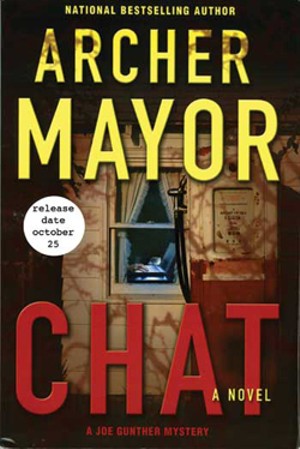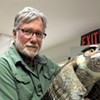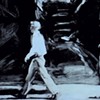Published October 10, 2007 at 8:24 p.m.
For loyal Archer Mayor readers, anticipation runs high this time of year. That's because the Newfane novelist churns out another Joe Gunther mystery each fall, almost like clockwork. When a new one arrives in stores, you know it signals the end of daylight savings time, the beginning of longer, colder nights and . . . hunting season. A perfect time, in other words, to settle in with a good book.
Mayor's latest, called simply Chat, is his 18th. That alone is an impressive achievement, and perhaps especially so for a series that subsists with essentially the same characters: Gunther, the Brattleboro-based head of the Vermont Bureau of Investigation, and his colorful coterie of detectives. Over the years, of course, Mayor has led this crew through significant changes - most notably the establishment of the VBI, several volumes ago; and the gradual dissolution of Joe's longtime relationship with Gail, who's now a legislator in Montpelier. Assessing the author's last installment, The Second Mouse, some critics judged the franchise to be a little tired. Whether or not Mayor himself thought so, he certainly worked up a new head of steam with Chat.
For starters, as the book's title hints, Chat takes on an au courant kind of crime: the online stalking of underage girls. There's nothing new about pedophiles, of course, but Mayor's introduction of the Internet into the arsenal of Vermont's seedier elements is realistically contemporary, and it's a believable device for turning - as he always has - the state's bucolic reputation upside down. In fact, the anonymous, ubiquitous phenomenon of the chat room makes its denizens, in some ways, far creepier foes than your average flesh-and-blood murderer.
Speaking of which, there are indeed dead bodies - one man found in a river, another face down on a motel bed - and the mystery is not just whodunit, but how. Naturally, that cannot be revealed here, but suffice it to say that no actual sex crime occurs in Chat: The unlucky would-be perps meet their demise instead.
But these are not the only mysteries in the novel - nor, despite the title, even the most important ones. A far more compelling drama begins with a serious car crash involving Gunther's mother and brother. Actually, it begins as they leave a movie at Dartmouth College on a cold winter night and head across the river to their home in Vermont. Previously only background figures in the series, these two characters take center stage in Chat. Joe's wheelchair-bound mother proves to be a bright, insightful and engaging elderly woman, while his brother Leo, a butcher by trade and mechanic by avocation, is a never-married serial dater who appears to prefer living, and hanging out, with his mom.
The development of these characters, and Joe's relationship with them, adds emotional depth to the book, while his relatives' near death on the road generates its other mystery. At the hospital, Joe finds Leo hooked up to tubes and monitoring machines, barely conscious. But he ignites Joe's investigation of the crash with one economical line.
Leo closed his eyes, and Joe realized he was fighting back tears.
"Leo," he told him, "it was an accident."
Leo took a ragged breath, reopened his eyes, and murmured, "It was the car, not the road."
As he and his associates solve these enigmas - two dead men with no IDs on one side, the apparent attempted murder of his mother and brother on the other - Gunther unravels several layers of family history. How the lives of Mrs. Gunther and her two sons intersect with those of local heavy E.T. Griffis and his two unfortunate offspring is the central, and most complex, intrigue in the book.
That's not to say the romantic subplot isn't compelling. Mayor has always done a commendable job of balancing Joe Gunther's private and professional lives. In Chat, old girlfriend Gail re-emerges to provide support at the hospital - she's been close to Joe's mother - and the author uses her as a device to complicate his hero's emotional state. But as Joe wrestles with his uncomfortable status as a lonely middle-aged man, Woman Number Two reappears from the past. Lyn Silva was a bit player in an earlier book, an attractive barkeep who helped with an investigation and stirred Joe's imagination just as his relationship with Gail was beginning to fray. This time, Lyn enters the picture when Joe is ostensibly "available." She's a dynamic new character for the series, and a provocateur of Joe's typical mental gyrations.
He studied the back of their guest as if she might suddenly pull a gun. He kept retrieving fragments of the one time they'd met, and coming up with only good memories. She was a single mother of a then twenty-year-old girl, a bookkeeper by day and a bartender at night, and at the time, at least, she'd been genuine, smart, sexy, and remarkably appealing - just as she appeared today.
But what was she doing here? When they last parted, he'd felt they had forged a definite connection, one that he would have pursued in Gail's absence. He'd even thought of locating her after his breakup, but had been stalled by both geography and a general emotional inertia.
Joe and Lyn's cautious, tentative steps toward each other put Mayor on solid ground - he's a pro at exploring the thoughts, feelings, insecurities and, yes, maturity of mid-life romance. And that dash of sweetness is welcome in a book that otherwise deals in troubled, menacing and downright despicable humans.
Mayor excels, too, in drawing on geography and history. He has always been thoughtfully observant not only of locale but of its big-picture context, and he continues this tradition in Chat:
This section of the Connecticut River Valley was absurdly pretty, slicing between New Hampshire and Vermont, and decorated with covered bridges, backwater bays, and cow-sprinkled farms. The background of ancient mountains behind the massive, undulating, dark river told a tale of humanity's struggle with nature, since both these weather-beaten New England states had eschewed their peaks for the water's edge and turned the river into a commercial highway for over two hundred years, luring pioneers, aboriginal and white, who had forged far inland and upstream for reasons benign and not.
Held up against such a portrait of heritage and beauty, not even a car graveyard stood much chance of becoming a significant eyesore.
When it comes to the cyber-landscape, though, Mayor isn't as confident. His device for incorporating the Internet into Chat is awkward at best. Rather than allowing specific characters to experience the chat room - to post or respond to messages; to feel, think, and act accordingly - he simply interjects sample exchanges between chapters:
Lonely: any hot girl wanna chat?
Hottie: yea
Shez: add me
Dislove: dude
Gangsta: ron how tall r u?
Shez: n u can hav a look
Hottie: what is it
Lonely: any hot girl wanna chat?
Hottie: kk
Dislove: bored
Hottie: so u gonna talk me something about yourself
. . . and so on. Some of the "chats" are innocuous, some more ominous, but mainly they are not very interesting. Unless this reader missed something, the dialogues just don't seem to thicken this particular plot.
Mayor's most eloquent language is devoted to the description of people and place. Perhaps it's no wonder, then, that he gives short shrift to the titular subject of the book: In his imagined chat room, the people are anonymous, the place, nonexistent. Updating the evidence is one thing, but what to do with that digital distance?
What Mayor does instead is layer multiple stories onto warm-blooded bodies - and a couple of cold ones - with old-fashioned storytelling verve.
For Vermonters, the familiar environs of Mayor's books lend his fiction added credibility. Other readers, especially those who prefer the postcard picture of the state, just have to take his word for it. And apparently, many do - enough to keep the award-winning author going, through 18 books and counting.
Readers just discovering Joe Gunther, though, can now go back to the beginning. Mayor's publisher recently granted him the rights to his first 12 books, some of which have been out of print, and the author plans to re-release them as trade paperbacks. The first volume is aptly titled Open Season.
Info:
Chat by Archer Mayor. Grand Central Publishing, 326 pages, hardcover $24.99.
From Chat
In the sudden darkness following the loss of both headlights, Leo's mother focused solely on the muffled sounds around her, coming from all sides as they continued farther and farther downhill. She began thinking about the cold water that might be waiting at the bottom - if that was the way they were headed.
And then it was over. In one explosive flash, she felt a shocking blow to the side of her head, the sense of some metallic object, perhaps a lug wrench, passing before her face, and then nothing.
Leo opened his eyes briefly before shutting them again with a wince, brought up short by a burst of pain in his left eye. He paused a moment, trying to sort through the throbbing at his temples, to remember what had happened.
"Mom?" he asked suddenly, attempting to see again, ignoring the pain. He shifted in his seat, looking in her direction. The car was black and utterly silent. Carefully, he reached out and touched her, the tips of his cold fingers slipping on something wet on the side of her head.
"Oh, Jesus," he murmured. He made to turn toward her and shouted in agony, the entire left side of his chest suddenly spiking as if electrified. He sat back, panting, and coughed, feeling as if his lungs were full of phlegm. He gingerly pushed through his overcoat at his ribs with his good hand and winced.
"God damn it," he said, mostly to hear his own voice. "Mom?" he repeated then, reaching out a second time, but lower, groping for her shoulder, which appeared to be fine - maybe merely because it was there at all.
But she wasn't moving.
It was cold, and the other thing his fingers had felt was snow. Somewhere there was a broken window. He had no idea how long they'd been here, had no clue if they were visible from the road. He didn't even know if they were both alive.
He followed her shoulder up to her neck and burrowed his index finger between her collar and the scarf she was wearing, probing for a pulse. He was a butcher, he thought ruefully. At least he knew his way around a body.
His fingers were too cold. If her heart was beating, he couldn't feel it, but he doubted he could have anyway. At least that was the comfort he gave himself.
"Okay, okay," he said softly. "Probably just as well. No pain, no struggling. She's got her coat on. Could be worse."
Still using his right hand, he touched the window next to him. Intact. He didn't feel as though they were on their side, and he couldn't hear running water, which meant they hadn't reached the river. So far, so good.
He felt down to the door latch and pulled it. Nothing. Probably jammed. With even fewer expectations, he tried the electric window toggle. He was rewarded with a gentle whirring sound and a cool waft of air against his cheek.
"No shit," he muttered, noticing how hard it was to breathe, to actually move his lungs. The window had lowered all the way. He considered shouting, but with the cold air had also come a wider silence, as from a chasm without bottom. He knew this road-it either had traffic or was empty. There were no pedestrians and few homes.
He had to get out.
More By This Author
Speaking of Book Review
-

Review of Sen. Patrick Leahy's New Memoir
Aug 26, 2022 -

Book Review: Pete the Cat and His Magic Sunglasses
May 27, 2016 -

Book Review: Penguin Cha-Cha
Mar 31, 2016 -

Book Review: Dog vs. Cat
Dec 16, 2015 -

Book Review: The Hummingbird by Stephen P. Kiernan
Nov 4, 2015 - More »
Comments
Comments are closed.
From 2014-2020, Seven Days allowed readers to comment on all stories posted on our website. While we've appreciated the suggestions and insights, right now Seven Days is prioritizing our core mission — producing high-quality, responsible local journalism — over moderating online debates between readers.
To criticize, correct or praise our reporting, please send us a letter to the editor or send us a tip. We’ll check it out and report the results.
Online comments may return when we have better tech tools for managing them. Thanks for reading.














































